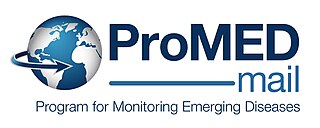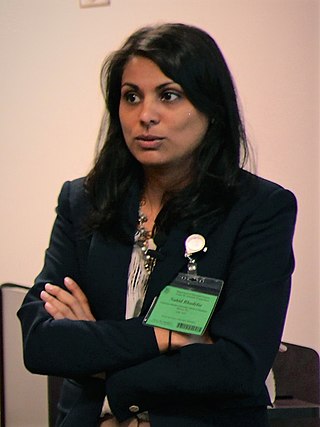
The American Society for Microbiology (ASM), originally the Society of American Bacteriologists, is a professional organization for scientists who study viruses, bacteria, fungi, algae, and protozoa as well as other aspects of microbiology. It was founded in 1899. The Society publishes a variety of scientific journals, textbooks, and other educational materials related to microbiology and infectious diseases. ASM organizes annual meetings, as well as workshops and professional development opportunities for its members.
The National Institute of Allergy and Infectious Diseases is one of the 27 institutes and centers that make up the National Institutes of Health (NIH), an agency of the United States Department of Health and Human Services (HHS). NIAID's mission is to conduct basic and applied research to better understand, treat, and prevent infectious, immunologic, and allergic diseases.
Translational medicine develops the clinical practice applications of the basic science aspects of the biomedical sciences; that is, it translates basic science to applied science in medical practice. It is defined by the European Society for Translational Medicine as "an interdisciplinary branch of the biomedical field supported by three main pillars: benchside, bedside, and community". The goal of translational medicine is to combine disciplines, resources, expertise, and techniques within these pillars to promote enhancements in prevention, diagnosis, and therapies. Accordingly, translational medicine is a highly interdisciplinary field, the primary goal of which is to coalesce assets of various natures within the individual pillars in order to improve the global healthcare system significantly.

Disease surveillance is an epidemiological practice by which the spread of disease is monitored in order to establish patterns of progression. The main role of disease surveillance is to predict, observe, and minimize the harm caused by outbreak, epidemic, and pandemic situations, as well as increase knowledge about which factors contribute to such circumstances. A key part of modern disease surveillance is the practice of disease case reporting.

The Infectious Diseases Society of America (IDSA) is a medical association representing physicians, scientists, and other healthcare professionals who specialize in infectious diseases. It was founded in 1963 and is based in Arlington, Virginia. As of 2018, IDSA had more than 11,000 members from across the United States and nearly 100 other countries on six different continents. IDSA's purpose is to improve the health of individuals, communities, and society by promoting excellence in patient care, education, research, public health, and prevention relating to infectious diseases. It is a 501(c)(6) organization.

Program for Monitoring Emerging Diseases is among the largest publicly available emerging diseases and outbreak reporting systems in the world. The purpose of ProMED is to promote communication amongst the international infectious disease community, including scientists, physicians, veterinarians, epidemiologists, public health professionals, and others interested in infectious diseases on a global scale. Founded in 1994, ProMED has pioneered the concept of electronic, Internet-based emerging disease and outbreak detection reporting. In 1999, ProMED became a program of the International Society for Infectious Diseases. As of 2016, ProMED has more than 75,000 subscribers in over 185 countries. With an average of 13 posts per day, ProMED provides users with up-to-date information concerning infectious disease outbreaks on a global scale.
The American Society for Bone and Mineral Research (ASBMR) is a professional, scientific and medical society established in 1977 to promote excellence in bone and mineral research and to facilitate the translation of that research into clinical practice. The ASBMR has a membership of nearly 4,000 physicians, basic research scientists, and clinical investigators from around the world.
The American Society of Tropical Medicine and Hygiene (ASTMH) is an Arlington, Virginia-based non-profit organization of scientists, clinicians, students and program professionals whose longstanding mission is to promote global health through the prevention and control of infectious and other diseases that disproportionately afflict the global poor. ASTMH members work in areas of research, health care and education that encompass laboratory science, international field studies, clinical care and country-wide programs of disease control. The current organization was formed in 1951 with the amalgamation of the American Society of Tropical Medicine, founded in 1903, and the National Malaria Society, founded in 1941.
The European Society for Paediatric Infectious Diseases (ESPID) is a non-profit medical association registered in Germany that focuses on paediatric infectious diseases. Since its founding in 1983, it has grown to include over 1300 members, from all over Europe and beyond. ESPID forms the basis for European clinicians and scientists interested in all aspects of infectious diseases in children and their prevention. The society is engaged in a number of activities including the organization of multicentre trials, international exchange of paediatric infectious disease fellows, educational activities, and an annual scientific conference.
Antimicrobial stewardship (AMS) refers to coordinated efforts to promote the optimal use of antimicrobial agents, including drug choice, dosing, route, and duration of administration.
Clinical Microbiology and Infection (CMI) is a monthly peer-reviewed medical journal publishing original research and review articles that assist physicians and microbiologists in their management of patients and the prevention of infectious diseases. CMI publishes manuscripts presenting the results of original research in clinical microbiology, infectious diseases, bacteriology, mycology, virology and parasitology, including immunology and epidemiology as related to these fields. The journal website offers online articles and issues as well as collections according to article type. The journal also publishes editorials, commentaries and reviews, as well as guidelines originating from ESCMID Study Groups. These guidelines and collections make CMI a reference source for infectious disease researchers, for practising clinicians and for informing people of emerging infections and new outbreaks.
The European Society of Clinical Microbiology and Infectious Diseases (ESCMID) is a non-profit international organization with headquarters in Basel, Switzerland. Its mission is to improve the diagnosis, treatment, and prevention of infection-related diseases by promoting and supporting research, education, training, and good medical practice. An important activity of the society is the organization of the annual European Congress of Clinical Microbiology and Infectious Diseases (ECCMID). This is recognized as the largest international forum for disseminating research in the fields of medical microbiology and infectious diseases for academic, clinical, and industry experts.

Professor Jonathan Samuel Friedland is a British physician and medical researcher who is Deputy Vice-Chancellor and Professor of Infectious Diseases at St George's, University of London.
The Society of Infectious Diseases Pharmacists (SIDP) is a non-profit association of pharmacists and other allied health professionals who specialize in infectious diseases and antimicrobial stewardship. According to the Board of Pharmaceutical Specialties, clinical pharmacists specializing in infectious diseases are trained in the use of microbiology and pharmacology to develop, implement, and monitor drug regimens that incorporate the pharmacodynamics and pharmacokinetics of antimicrobials for patients.

Nahid Bhadelia is an American infectious-diseases physician, founding director of Center for Emerging Infectious Diseases Policy and Research (CEID) at Boston University and an associate professor at the Boston University School of Medicine. She served as the Senior Policy Advisor for Global COVID-19 Response on the White House COVID-19 Response Team.

Müge Çevik is a physician who is an infectious diseases researcher and science communicator at the University of St Andrews. Her research considers HIV, viral hepatitis, emerging infections and tropical infections in developing countries. During the COVID-19 pandemic, Çevik was an advisor to the Chief Medical Officer of Scotland and the World Health Organization, and is a member of New and Emerging Respiratory Virus Threats Advisory Group - an expert committee of the UK Department of Health advising Scientific Advisory Group for Emergencies.

Tara N. Palmore is an American physician-scientist and epidemiologist specializing in patient safety through prevention of hospital-acquired infections. As of 2021 she was the hospital epidemiologist at George Washington University School of Medicine and Health Sciences.
Hanan H. Balkhy is a Saudi physician who currently serves as the first Assistant Director of Antimicrobial Resistance at the World Health Organization.
Associate Professor Asha Bowen is an Australian Paediatric Infectious Diseases clinician-scientist and a leading voice and advocate for children's health and well-being. She is Head of the Department of Infectious Diseases at Perth Children's Hospital, Head of the Healthy Skin and ARF Prevention team and Program Head of the End Rheumatic Heart Disease program at the Telethon Kids Institute. Bowen leads a large body of skin health research in partnership with healthcare workers and community in the Kimberley while expanding her team and work to understand skin health in urban Aboriginal children better. She has been widely acknowledged and awarded for her contributions towards improving the health and well-being of Australian children, and addressing existing health inequities faced by First Nations Australian children and their families. Throughout the COVID-19 pandemic she contributed her knowledge and expertise to clinical research, guideline development and on several national committees. She has published widely in the area of paediatric infectious diseases and is a recognized expert in the field who regularly contributes to popular Australian media sources such as The Conversation.

Adeel Ajwad Butt is a Pakistani–American infectious diseases physician, professor of medicine and population health sciences at the Weill-Cornell Medical College He is also the founder president and CEO of Innovations in Healthcare Advocacy, Research and Training (I-HART).












